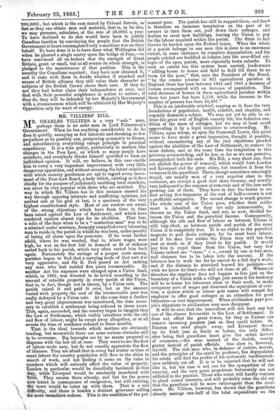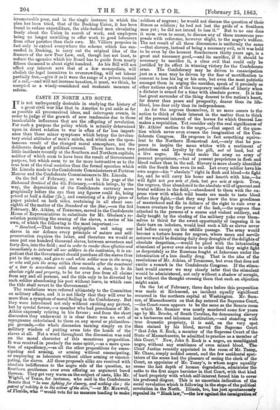MR. VILLIERS' BILL.
MR. CHARLES VILLIERS is a very " safe " man, perhaps there is no safer man in Lord Palmerston's 'Government. When he has anything considerable to do he does it quietly, annoying as few interests and shocking as few prejudices as he possibly can, postponing symmetry to fitness, and subordinating everything except principle to practical .expediency. It is a wise policy, particularly in matters like 'changes in the Poor Law, on which so many people have -crotchets, and everybody thinks himself qualified to form an individual opinion. It will, we believe, in this case enable him to carry a very important improvement with very little 'dangerous opposition, and without arousing the latent suspicion with which country gentlemen are apt to regard every move- ment of the Poor-Law Board, a body which, existing as it does chiefly for the purpose of judiciously snubbing local crotchets, can never be very popular with those who are snubbed. The way in which Mr. Villiers has in this instance steered his way through opposing interests and conflicting opinions, yet arrived safe at his goal at last, is a specimen of the very highest constitutional style. Most of our readers are aware -of the strong objections which have from time to time been raised against the Law of Settlement, and which have trendered opinion almost ripe for its abolition. That law, a relic of the days when to be a "masterless man" was to be a criminal under sentence' formerly compelled every labouring man to reside in the parish in which he was born, under penalty of losing all claim upon the poor-rate. If he went farther afield, where he was wanted, that is, where wens were high, he was on the first lull in demand or fit of sickness carted back to his parish, which very often carted him back -again. Fortunately the cartage of a pauper costs money, parishes began to find that a carrying trade of that sort was -very oppressive, and Sir R. Peel passed an Act making any man who had resided five years irremoveable. By -another Act his expenses were charged upon a Union fund, -which, in 1861, was directed to be levied according to the amount of rateable property in every parish of the Union, that is, in fact, though not in theory, by a Union rate. The parish raised it and paid it over, but as the amount -varied with property the cost of the irremoveable poor was really defrayed by a Union rate. At the same time a further and very great improvement was introduced, the time neces- sary to establish a settlement being reduced to three years. 'This again, succeeded, and the country began to imagine that the jaw of Settlement, which visibly interferes with the ebb and flow of labour, might be swept away altogether, or at all avents the time of residence reduced to three months.
That is the ideal towards which matters are obviously tending, but meanwhile there are some serious obstacles still to be overcome. Big boroughs are by no means prepared to dispense with the law all at once. They want to see the flow 'of labour made easy, but do not exactly appreciate the flow of idleness. They are afraid that in every bad winter or time of -scant labour the country population will flow to the cities in search of work, and not finding it come on the rates in numbers which will seriously affect the value of property. London in particular would be dreadfully burdened in that way, while Liverpool would be absolutely inundated with Irish. They swarm there already, and but for the power now latent in consequence of emigration, but still existing, the town would be eaten up with them. That is a real
• difficulty, and there is besides a distinct grievance calling for more immediate redress. This is the condition of the per- manent poor. The parish has still to support them, and there is therefore an immense temptation on the part of its owners to turn them out, pull down their cottages, and decline to erect new buildings, leaving the Union to pay for the labour required within the parish. The State in fact throws its burden upon the Federal taxes. When the whole of a parish belongs to one man this is done to an enormous extent, in some instances by complete depopulation, and the people evicted are huddled as lodgers into the over-filled cot- tages of the open parish, more especially town suburbs. To such an extent has this system been carried, landowners "adding house to house and field to field till there be no room for the poor," that, says the President of the Board, "by the census returns in 821 agricultural parishes in England there has been between 1851 and 1861 a decrease of houses accompanied with an increase of population. The total decrease of houses in these agricultural parishes within these ten years has been 3,118, while the increase in the number of persons has been 16,497."
This is an intolerable mischief, sapping as it does the very foundations of population, health, comfort, and chastity, and urgently demands a reform. We may not yet be able to re- dress the great evil of English country life, the defective con- dition of the mass of cottages, but we may at least avoid aggravating it by a legal incentive to overcrowding. Mr. Villiers, upon whom, as upon Sir Cornewall Lewis, this point seems to have made a great impression, thought it possible, without encountering any of the just objections pleaded against the abolition of the Law of Settlement, to remove its main defects, and at the same time the temptation to this grievous overcrowding, and he has, so far as we can perceive, accomplished both his ends. His Bill, a very short one, does not abolish the power of removal, which would hurt London and Liverpool and the great cities, but transfers it from the overseers to the guardians. These, though sometimes amazingly stupid, are usually men of a very superior class to the overseers, are always a good deal more humane, and usually very indisposed to the expense of removals and of the law-suits growing out of them. They have in fact the brains to see that saving five tixpences at the cost of half-a-crown is not a profitable occupation. The second change is much greater. The whole cost of the Union poor, whether their settle- ment is inherited or they are only irremoveable, is thrown on the Union fund, and not, as now, divided be- tween the Union and the parochial income. Consequently, although the ebb and flow of labour as between Unions is still imp A-fect, as between parish and parish of the same Union it is completely free. It is no object to the parochial magnate to pull down cottages, for he must have labour, and if his men live within the Union they will tax him just as much as if they lived in his parish. It would pay him to expel them from the Union, but very few Unions indeed are "close," i. e., owned by one or two men, and distance has to be taken into the account. If the labourer has to walk too far he cannot do a full day's work, and if the distance be stretched beyond his patience—we wish we knew its limit—he will not come at all. Whenever therefore the employer does not happen to live just on the boundary of a Union with a village just across it his tendency will be to house his labourers close to their work, to make occupancy part of wages and dismissal the equivalent of evic- tion, a system which as labour gets scarce will compel the employer to offer good cottages as an attraction for good labourers—a vast improvement. When civilization pays peo- ple's objections to civilization very soon disappear. It will be seen that the innovation will not hurt any but one of the classes favourable to the Law of Settlement. It does not affect the great towns, for they as Unions can remove incoming paupers- iast as they could before. St. Pancras can send people away, and Liverpool throw up its Irish just as freely as before, the only .differ- ence being that guardians must give the orders instead of overseers,—the wise instead of the foolish, county gentry instead of parish officials. One class is, however, injured. The rich man who, in defiance of justice, morals, and the principles of the creed he professes, has depopulated his estate will find the profits of his systematic hardhearted- ness suddenly cut off. It is to be expected that he will not like it but his case is not one for the sympathies of the country, and the very great proprietors fortunately are not addicted to the practice. Those who resist will hardly venture to plead vested interests, and will probably raise the old cry that the guardians will be more extravagant than the over- seers. Mr. Villiers, however, has shown that the guardians already manage one-half of the total expenditure on the irremoveable poor, and in the single instance in which the plan has been tried, that of the Docking Union, it has been found to reduce expenditure, the able-bodied men circulating freely about the Union in search of work, and employers being no longer unwilling to offer work to good labourers from other parishes than their own. Mr. Villiers proposes in fact only to extend everywhere the scheme which has suc- ceeded in Docking, to carry out the original idea of the framers of the new Poor Law, and, though last not least, to reduce the agencies which his Board has to guide from nearly fifteen thousand to about eight hundred. As his Bill will not affect any interest save that of a few monopolists, will abolish the legal incentives to overcrowding, will set labour partially free,—give it as it were the range of a prison instead of a cell,—and will not increase taxation, it must, we think, be accepted as a wisely-considered and moderate measure of reform.



































 Previous page
Previous page